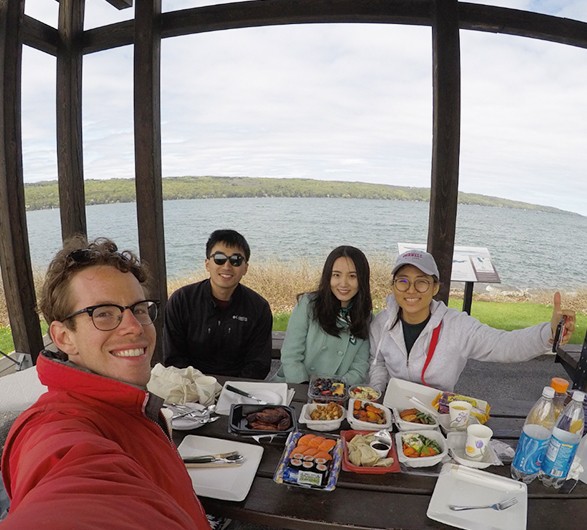International Speaking Groups broaden perspectives
The ELSO Speaking Groups Program, sponsored by the English Language Support Office, offers small, one-hour weekly discussions with international graduate students and scholars at Cornell. Each group is facilitated by a Cornellian who volunteers and completes an orientation process. Participants meet for eight weeks per semester at a location of their choosing.
“By talking with friends in my speaking group, I learned a lot other than language from everyone’s previous experiences about diverse culture, history and people of other countries,” says Zhiyun Li, an environmental economics doctoral student from Tianjin, China. “We also became good friends, and we share interesting things that happen in our lives with each other, which is a joy. I would like to recommend this program to other students.”
The international graduate students and scholars are from diverse programs and linguistic backgrounds, and at diverse points in their academic pursuits.
“The speaking group has been a good opportunity for us to discuss activities and experiences outside the classroom/lab, and also to take short trips to nearby areas like the Big Red Barn, Botanic Gardens, and Collegetown,” says Patrick Muljadi, a doctoral student in biomedical engineering and a group facilitator.
This semester, 20 speaking groups are serving nearly 100 international student and scholar participants.
“I have attended the speaking program almost every semester when it is available," said Lijie Tu, a physics graduate student from southern China. "For most graduate students, life is confined to the classroom, office/lab and home because we are very busy and usually know few people outside our discipline. I made lots of friends and have come to know different cultures much better via the program. Facilitators are extremely nice and helpful. All participants are curious and eager to learn.”
The conversations focus on culture, academic interests and campus life. Some groups define topics for discussion; others just meet and talk informally.
“Our Speaking Groups Program is a great opportunity for integrating students, faculty, staff, and post-docs on campus in informal settings,” said Melissa Myers, lecturer and coordinator of speaking services in the English Language Support Office. “The goal is to improve English speaking skills while making meaningful connections across campus.”
Email Myers for more information about becoming a participant or facilitator for fall 2018.
Media Contact
Get Cornell news delivered right to your inbox.
Subscribe

